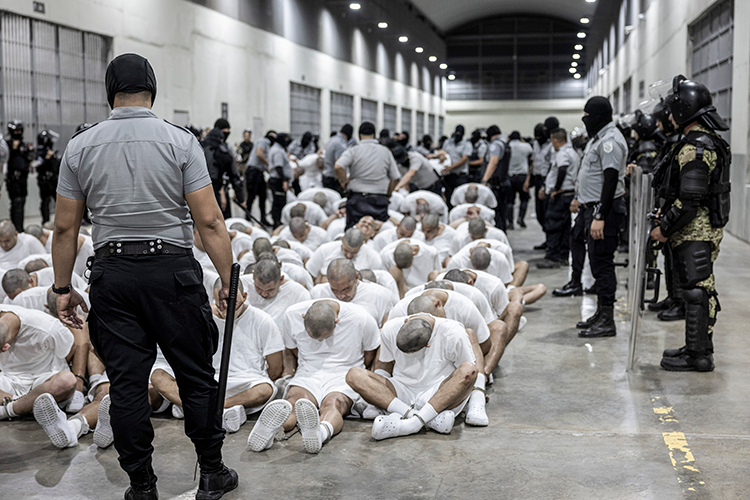Immigration Law
Trump administration invokes state secrets privilege for deportation flights, disputes Nazi analogy

A prison guard transfers deportees from the United States, alleged to be Venezuelan gang members, to the Terrorism Confinement Center in Tecoluca, El Salvador, on March 16. (Photo by the El Salvador presidential press office via the Associated Press)
Government lawyers are arguing that the state secrets privilege protects the Trump administration from divulging details about deportation flights to El Salvador in Central America, and that the Venezuelans aboard weren’t entitled to notice that would give them time for a hearing.
Lawyers made those assertions Monday to a federal judge and a federal appeals court considering the administration’s use of the Alien Enemies Act of 1798 to deport suspected Venezuelan gang members. The deportees were taken to a prison in El Salvador, where the conditions “are reportedly parlous,” according to Chief U.S. District Judge James E. Boasberg of Washington, D.C., who is overseeing the challenge to the law.
The New York Times, the Associated Press, Politico, the Washington Post, NPR and NBC News have coverage.
In a March 24 notice, the government invoked the state secrets privilege to avoid disclosing further details about flights carrying the deportees in what the New York Times termed a “stubborn response” and “a patent act of defiance.”
Boasberg had sought information about the timing of the flights to determine whether the government violated his March 15 temporary restraining order telling U.S. officials to stop or turn around the flights.
The government court filing said disclosing information about tracking of the flights “would both endanger the government personnel operating those flights and aid efforts by our adversaries to draw inferences about diplomatic negotiations and coordination” regarding the removal of “terrorists and other criminal aliens from the country.”
The New York Times said the government stance “is extraordinary in part because it is refusing to provide information to Judge Boasberg—a former presiding judge of the nation’s national security surveillance court—even privately and in a secure facility for handling classified information.”
Earlier Monday, Boasberg refused to vacate his TRO that bans the administration from using the Alien Enemies Act, last invoked during World War II, for the deportations.
The government has argued that Venezuelan gang members were acting under the direction of the Venezuelan government, a hostile nation, and their arrival in the United States was a “predatory incursion,” according to the New York Times.
Boasberg said in his opinion the government’s “unprecedented use” of the act outside wartime “implicates a host of complicated legal issues.” But there was no need to resolve the “thorny question” about the use of the act, Boasberg said, because the plaintiffs are likely to succeed on the claim that they were entitled to hearings before deportations.
That issue was before the U.S. Court of Appeals for the District of Columbia Circuit on Monday as the government sought a stay of the TRO. According to the Washington Post, government lawyers acknowledged that the suspected gang members are entitled to hearings but said the government doesn’t have to tell them that they have been deemed to be “alien enemies” or give them time to request hearings.
D.C. Circuit Judge Patricia Millett commented that there were no procedures in place to notify the suspected gang members.
“Nazis got better treatment,” Millett said, referring to the use of hearing boards to remove suspected Nazis during World War II.
“We certainly dispute the Nazi analogy,” said Deputy Assistant Attorney General Drew Ensign.
The case is J.G.G. v. Trump.
See also:
Trump’s deportation push tests courts’ ability to check his power
Write a letter to the editor, share a story tip or update, or report an error.

